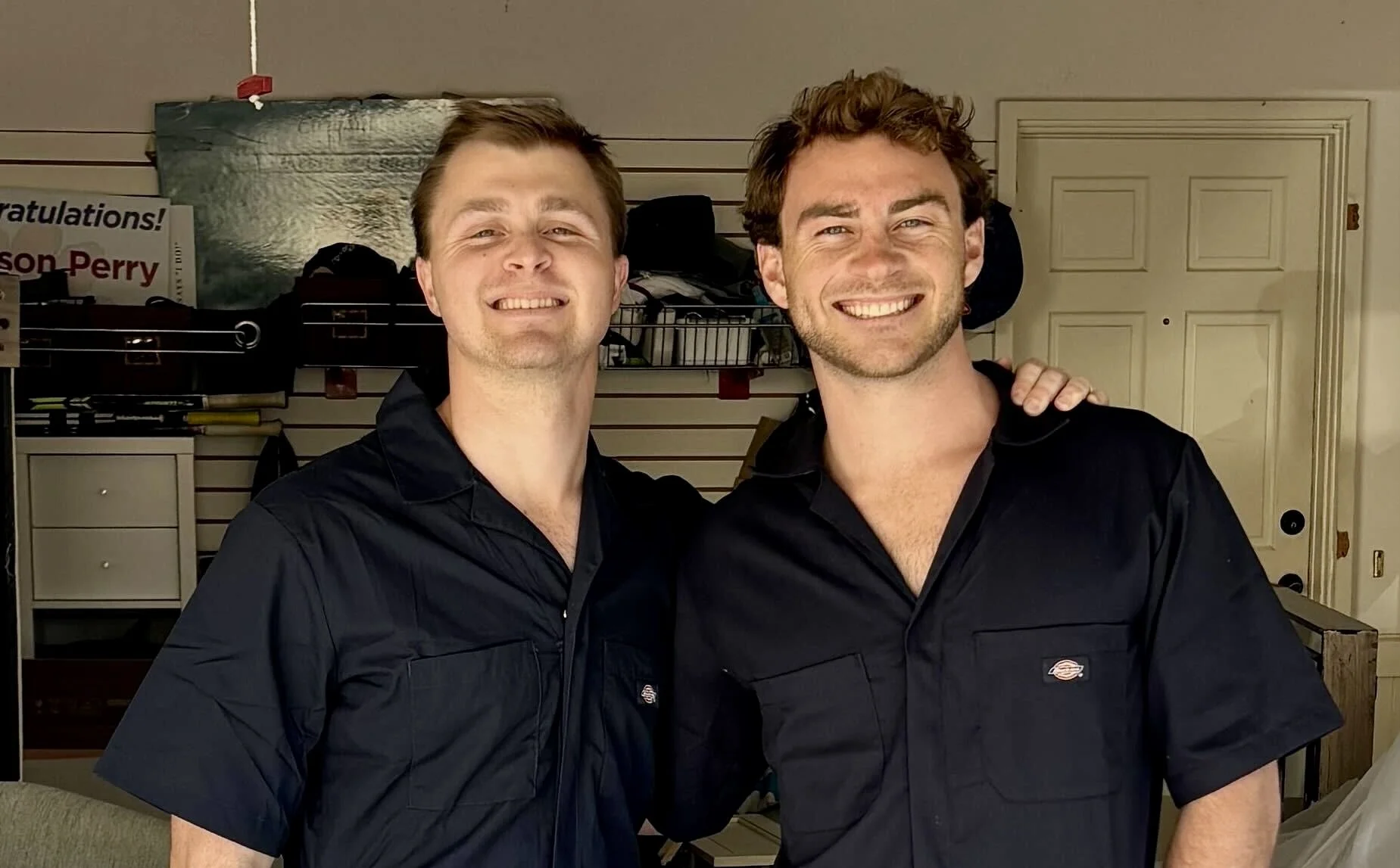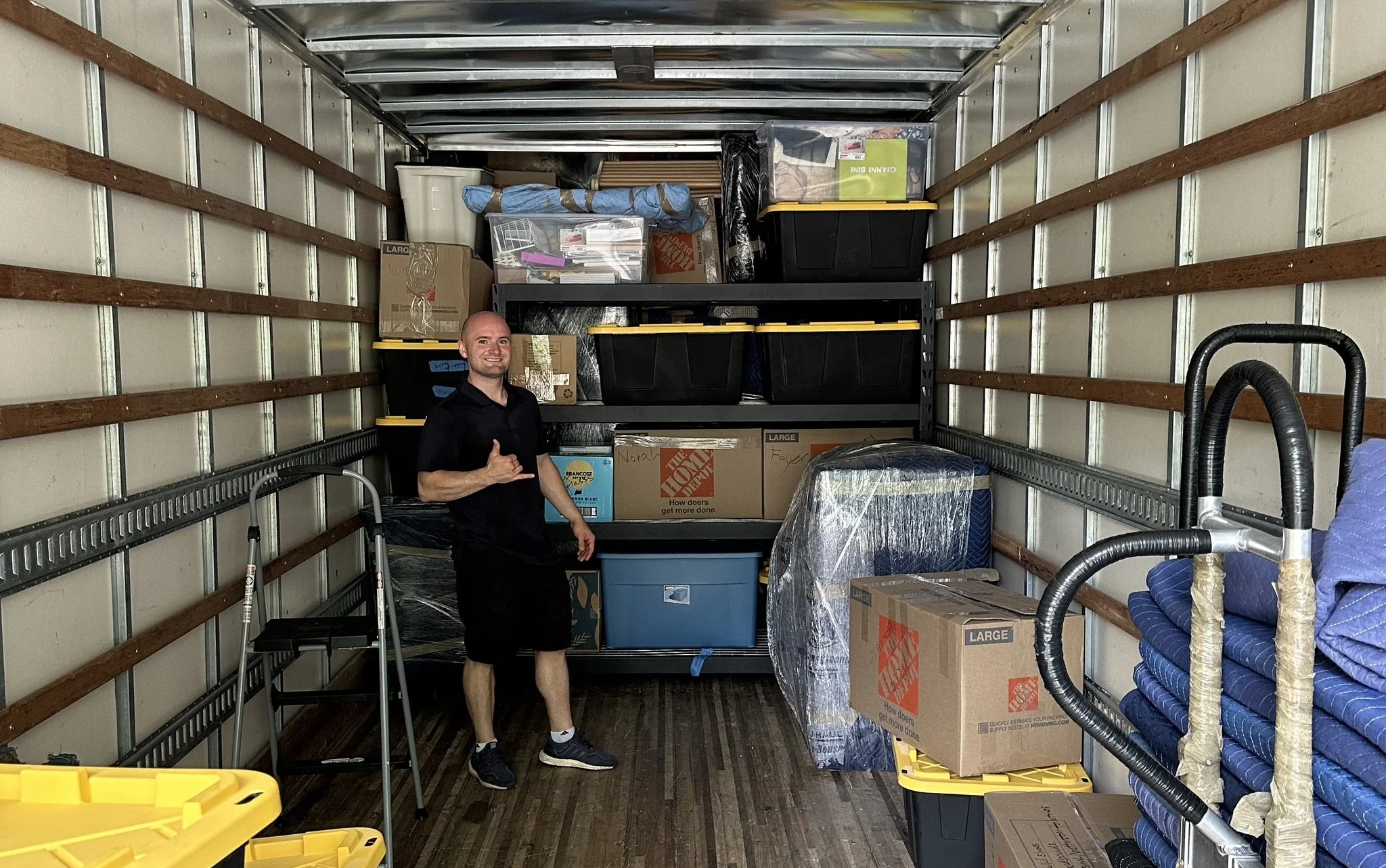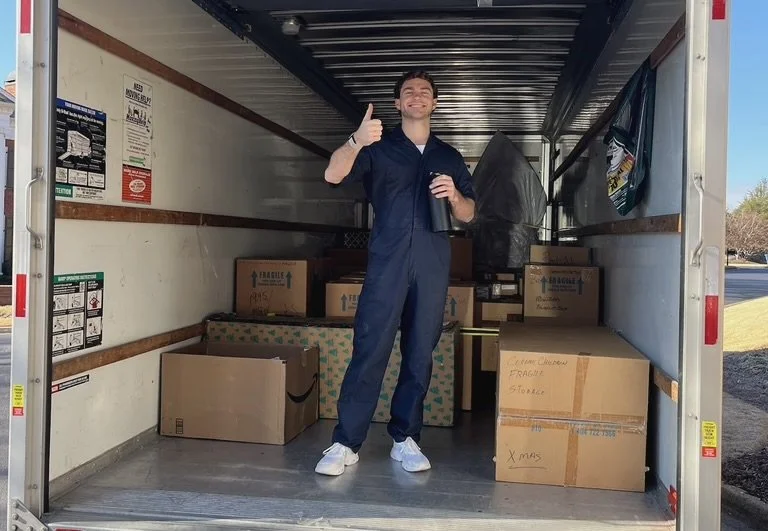Good Guys Serve: How Kindness Became a Winning Business Model
When most of us think about the future of business, we imagine AI assistants, automated workflows, and digital transformation. But for Trent Barron, co-founder of GoodGuys Concierge Moving & Storage, the future looks surprisingly human.
"I'm in an almost laughable situation," Trent admits, "where I fully believe in AI and the potential it has for us — being able to build great things that ultimately help people — but at the same time, I'm also very much against AI’ing everything."
This tension, between a fascination with cutting-edge technology and a commitment to preserving human connection, has helped shape Trent's business philosophy and the ethos of GoodGuys.
In an industry riddled with damaged furniture, hidden fees, and workers who'd rather be anywhere else, Trent and his co-founder Andrew are betting everything on a radical premise: what if a moving company actually cared?
GoodGuys co-founders Trent Barron (left) and Andrew Johnson (right)
The Education of a Servant Leader
Trent's path to the moving business wasn't exactly linear. Growing up in Fort Worth, Texas, he thought he wanted to spend his career building physical things — maybe become a mechanical engineer, tinker with materials. But after starting the program at the University of Georgia, he began to second guess this career path.
"First semester, I was taking engineering classes and calculus. I wasn't great at it, and didn't see myself enjoying that path moving forward," he recalls.
What followed was an education in breadth rather than depth. A cognitive science degree. A business minor. An entrepreneurship certificate. New media studies with graphic design and front-end coding. Each piece seemed disconnected at the time, but looking back, Trent was unconsciously preparing for something he couldn't yet name.
His first attempt at entrepreneurship came after graduating college and getting hands-on experience working for another start-up.
He was going to build a furniture resale business with a compelling tagline: "Make resale as easy as retail."
The idea was to curate beautiful furniture pieces, remove the stress from selling, and bring beauty into people's homes.
It failed within months.
"I had all these ideas of how we would take the stress out of selling furniture," Trent reflects. "And that's when I learned a big lesson — you can't serve people if you don't have something that actually works."
In other words, you can’t serve customers with big ideas or grand ideals. You have to execute.
Trent’s first failure could have been the end of his entrepreneurial journey. Instead, it became the foundation for everything that followed.
Purpose in the Pivot
The pivot to moving and storage wasn't some grand strategic vision. It started with Trent's dad, who had built a business called Storage by the Size — offering storage priced according to how much a customer stores rather than by the unit. But Trent saw a problem: how do you find storage customers?
"Most people will just go and get a storage unit if they need to store something," he reasoned. "How are we supposed to find those people?"
The answer came through an unexpected partnership. He met Andrew, one of his wife's best friends, who shared Trent's values and passion for small business.
Together, they realized that moving could be the gateway to storage. Do an excellent job helping people move their belongings from one home to another, and they'll trust you to store and take care of those belongings long-term.
But here's where GoodGuys distinguished itself from the start: Trent and Andrew are not just entrepreneurs — they are servant-leaders and men of faith. They didn't just see a business opportunity. They saw a chance to serve people during one of their most vulnerable moments.
"All things considered, taking a 30,000 foot view of your life, moving is one of the top 10 most stressful things you can do in life," Trent explains. "We wanted to come into those stressful situations, alleviate as much tension as possible and be able to bring joy to people's moves."
Joy. Moving. The words don't usually appear in the same sentence.
The Chick-fil-A of Moving
When Trent talks about the role of his Christian faith in business, he's careful not to oversell it.
"You don't necessarily want to apply biblical principles, or Jesus, to a business to make money. That feels kind of gross," he says. “But Jesus is the best example of a servant.”
While they may be too humble to say this openly, Trent and Andrew are building “the Chick-fil-A of moving" — not because they're closed on Sundays or play Christian music in their trucks, but because they’ve structured the business around true servant-leadership, modeled by their faith.
In practical, everyday terms: they put customers and employees before the business itself.
“We want people to be taken care of,” Trent says, “and to feel like working with us isn’t just transactional. This is a relational thing.”
It’s a wonderful approach in theory, but what about when it’s tested?
Recently, an employee damaged customer furniture on three consecutive moves.
"My first reaction was to be mad, and to be like ‘What are you doing?!’" Trent recalls.
Instead, he talked to employee. Asked what happened. Asked how they could both be better. Framed it not as punishment but as growth.
"We want you to be better for yourself, not for [the company]," he told the employee. "It helps when you're better for us, but ultimately we want you to take something away from this experience, too."
The Surprising Success of Simple Kindness
Here's what shocked Trent most about building GoodGuys: it actually worked.
After his furniture business failed, he'd become pessimistic about entrepreneurship. But GoodGuys has grown every single month since January, with gross profits increasing even when revenue occasionally dipped.
The secret? Things that shouldn't be differentiators, but somehow are.
Show up on time. Wear uniforms. Be kind. Do what you say you're going to do.
"People really appreciate what we're doing and how we're doing it," Trent says with genuine surprise. "The simple business model of kindness has worked."
The success created new responsibilities, though. Four full-time employees now rely on GoodGuys for their livelihoods — something that weighs heavily on both co-founders.
"By far our biggest concern is making sure that our guys are taken care of, because they trusted us with building this company, and it’s basically still brand new," Trent explains.
The Human Premium in an Automated World
What strikes me about Trent’s approach to business is that, despite the fascination with emerging technology, and a belief in its potential, he's betting on a counter-trend.
"We're going to come to a point where we look back and remember when we used to meet up in person, and talk to people, and when people checked us out at the grocery store, and even pumped our gas," he predicts. "Inherently we crave community as humans."
It's not that GoodGuys rejects technology.
They use it strategically — to handle minute tasks, improve efficiency, free up time for what matters. But the core of the business remains stubbornly, defiantly human.
"Not everyone wants a robot to answer the phone," Trent insists.
In their world, AI handles the scheduling so humans can handle the relationships. Technology manages the logistics so people can manage the moments that matter, like turning someone's stressful moving day into something they might actually remember fondly.
The Man in the Arena
When asked what advice he'd give to someone wanting to create positive change in their industry, Trent doesn't hesitate: "You have to start somewhere. You have to do something … Just take action.”
Trent admits to struggling with this himself — always planning, always thinking about what could go wrong, always wondering who might see him fail.
But he says that when you’re constantly second guessing, it really helps to work with someone like Andrew who operates more in the realm of, “Let’s just do it and see what happens.”
And, more than that, his first attempt at building a business taught him something crucial.
"I did fail. And then I looked around and it was like no one cared, in the best way," he says. "No one actually cares. And the people who do care are very supportive."
This willingness to be vulnerable extends to transparency. GoodGuys posts detailed monthly metrics on LinkedIn — revenue, growth, struggles, victories. Not to boast, but to bring people along on the journey. To share the ups and downs with those who do care.
Moving Forward
Trent Barron began his professional journey looking to build physical things. Instead, he's building something a lot more complex and necessary: a business that treats people like human beings, in an industry that often forgets they exist.
"I wanted so badly to build something that I had ownership in," he reflects, "that I could work really hard on, even if it was 100 hours a week. I just wanted to have that opportunity, to build something that matters, that works, that serves people."
But this is important: he never would have built GoodGuys and gotten the opportunity to serve people without taking action, experiencing failures, and learning from them.
In a world dominated by screens and algorithms, Trent and Andrew are building something decidedly analog: a company where people serve people, where kindness is strategy, and where the simple act of showing up on time in uniform can be revolutionary.
They're not saving lives, as Trent readily admits. They're just moving furniture. But in doing so with intention, faith, and radical kindness, they're proving that even in a modern age, there's still room for businesses built on the oldest technology of all: human connection.




